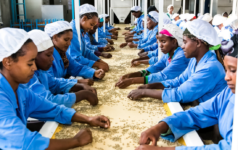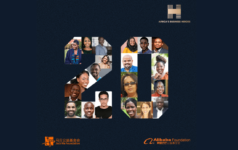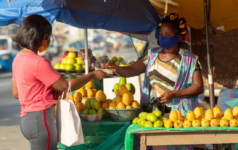Dalberg uses cookies and related technologies to improve the way the site functions. A cookie is a text file that is stored on your device. We use these text files for functionality such as to analyze our traffic or to personalize content. You can easily control how we use cookies on your device by adjusting the settings below, and you may also change those settings at any time by visiting our privacy policy page.
More than 5,000 business leaders, policymakers, and experts came together at WCEF, where Dalberg—in our role as secretariat of the African Circular Economy Alliance (ACEA)—moderated a discussion on ways to bring about more sustainable production and consumption across the continent.
The circular economy offers an opportunity to boost African economies while helping to mitigate climate change impacts, and it was the topic at hand at WCEF, an annual conference hosted by SITRA, the Finnish Innovation Fund. Representatives from across sectors came together across two days in September 2020 to discuss and deliberate on the world’s most promising circular economy solutions.
As the secretariat of the African Circular Economy Alliance, Dalberg moderated the session, “Fostering inclusivity with circularity in Africa’s post Covid-19 recovery,” which explored local practices and innovations that can help drive resource use efficiency and job creation, and ways countries can integrate circularity into their long-term strategies for mitigating carbon emissions and developing climate resilience.
Session participants included:
- Dr. Anthony Nyong, the African Development Bank’s Director for Climate Change and Green Growth
- Dr. Patrick Mwesigye, Regional Coordinator of Resource Efficiency at UNEP
- Dr. Ndidi Nnoli Edozien, Chair of the Circular Economy Innovation Partnership Africa
- Mr. Bruno Pietracci, President, Coca Cola Africa
- Mr. James Mwangi, Executive Director of Dalberg Group served as moderator
Panelists discussed promising circular initiatives on the continent, such as the EU-funded SWITCH Africa Green Programme being led by Dr. Patrick Mwesigye, UNEP’s Regional Coordinator of Resource Efficiency. Through the program, UNEP supports new circular businesses in Burkina Faso, Ghana, Kenya, Mauritius, South Africa and Uganda. Similarly, the African Development Bank provides innovative finance to bridge the gap faced by women and youth-led green businesses through the Affirmative Finance Action for Women in Africa (AFAWA) and the Youth Entrepreneurship & Innovation (YEI) Trust Fund.
Commenting on the Bank’s initiatives, Dr. Nyong, the African Development Bank’s Director for Climate Change and Green Growth, said that inclusive finance must go hand-in-hand with policy reforms to catalyze the creation of enabling environments that support the African people—especially vulnerable groups—that have been sidelined from economic growth.
Dr. Ndidi Ndoli Edozien, Chair of the Circular Economy Innovation Partnership Africa, acknowledging the opportunity for nature-based solutions to promote sustainable production and consumption, stated that “indigenous African culture plays a key role in circularity. The circular economy responds to a design problem and nature is an intuitive part of being African. When you improve the environment, you improve people’s livelihoods”.
Mr. Bruno Pietracci, President, Coca Cola Africa, reflected on the role of the private sector to enable recycling value chains, including food-grade recycled plastics, as well as promote advocacy for regional trade and regulatory policies to facilitate scaled and competitive plastic recycling operations on the continent. He said Coca Cola’s returnable glass bottle which has up to 98% recovery and reuse rate in Nigeria and many other countries is a great example of circular packaging and there is significant progress on plastics in South Africa where some of Coca-Cola’s bottles contain 15% and some 100% rPET made from plastics collected and recycled locally, contributing to South Africa’s high plastic recycling rate of about 60%.
Panelists agreed that food & beverage companies and multinationals must engage more extensively with SMEs and workers at the bottom of the pyramid to unleash capital and encourage new business models and innovations that could help contribute to an inclusive and sustainable post-Covid recovery.
Mr. James Mwangi, Dalberg Group Executive Director, synthesized the megatrends requiring urgent attention, including the systems of inequalities, the global Covid-19 pandemic, the resulting economic crisis and the underlying and continuing climate crisis. The needs he expressed in his final call to action included: greater investments to scale up opportunities, a shift in corporate behaviour, faster innovation, and the development of effective policies. Mr. Mwangi then emphasized that collective action can be made possible by platforms such as the African Circular Economy Alliance (ACEA).
Closing the session, Ms. Lora Borissova, Senior Expert in the Cabinet of Jutta Urpilainen–European Commissioner of International Affairs, noted that all groups and all stakeholders must work together through partnerships to maintain the momentum around circular economy and strengthen dialogue and collaboration between Africa, Europe and the rest of the world.
In conjunction with the event, H.E Barbara Creecy, Minister of Environment, Forestry and Fisheries of the Republic of South Africa and current Co-chair of the ACEA, gave her endorsement through an official statement highlighting “the need to upscale the ACEA work at the national, regional and continental levels to improve the way in which we produce and consume goods and services, reduce waste, create jobs, empower women for gender mainstreaming, mobilise the youth and contribute to sustainable development”.








